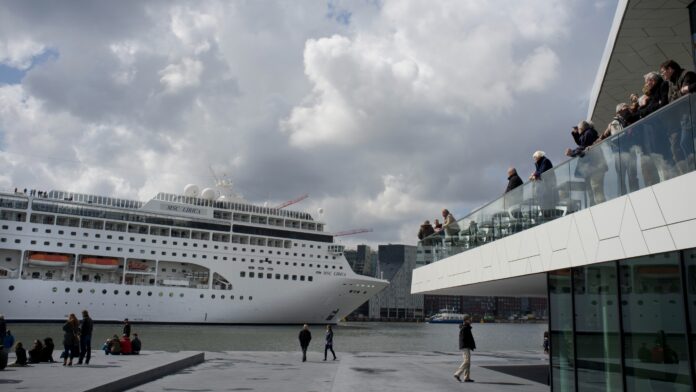In a significant move to protect its unique charm and address environmental concerns, the city of Amsterdam has made a resolute decision to ban cruise ships from its city center. This decision comes as part of the Dutch capital’s ongoing efforts to limit visitor numbers and curb pollution, signaling its commitment to sustainable tourism and preserving its cultural heritage.
The central cruise terminal on the River IJ, near Amsterdam’s main train station, will be closed as a result of this ban, putting an end to the frequent mooring of more than 100 cruise ships in the city every year. Cruise ships have become emblematic of the over-tourism issue that Amsterdam has been facing, drawing in 20 million visitors annually, many of whom are attracted by the city’s party reputation.
The move to prohibit cruise ships from docking in the city center has been met with approval from politicians who believe these large vessels are incongruent with Amsterdam’s vision for a sustainable future. The liberal D66 party, along with the Labour party and environmentalists, supports this initiative, citing that reducing the influx of tourists aligns with Amsterdam’s goal of preserving its unique character and cultural heritage.
One of the main driving forces behind the ban is the aim to lower air pollution levels in the city. Studies have shown that a single large cruise ship can produce as much nitrogen oxides (NOx) in a day as 30,000 trucks, highlighting the significant impact of these vessels on Amsterdam’s air quality.

Furthermore, the decision to restrict cruise ships from the city center is also expected to foster a more balanced tourism experience. Mayor Femke Halsema has previously expressed concerns that cruise tourists, with their brief stopovers, often gravitate towards international chains, neglecting to explore the city’s cultural offerings fully. This imbalance has raised concerns about the city’s dependence on mass tourism and its potential to undermine the local culture and economy.
In addition to curbing cruise ship arrivals, Amsterdam has also been taking proactive measures to manage mass tourism effectively. Notably, the city launched an online campaign urging young British men to reconsider holding their bachelor parties in Amsterdam, seeking to dissuade activities that contribute to excessive tourism and create a negative impact on the city’s infrastructure and environment.
Furthermore, the municipality has been taking steps to maintain order and culture in the renowned red-light district, such as banning cannabis smoking on its streets.
In a separate development, Amsterdam has also demonstrated its commitment to nurturing its vibrant night-time culture for young people. The city has unveiled plans to discover and develop potential nightclub locations, including disused tunnels and garages, aimed at supporting creative young talents who wish to organize events and activities during the night.
The decision to ban cruise ships from the city center marks a significant turning point in Amsterdam’s journey towards sustainable tourism and environmental preservation. By taking these bold measures, the city seeks to strike a harmonious balance between hosting visitors and safeguarding its cultural heritage, while simultaneously working to reduce pollution levels and create a more enriching experience for tourists and locals alike. As Amsterdam continues to lead by example, it is hoped that other cities worldwide will follow suit in adopting responsible tourism practices and protecting the treasures that make each destination unique.





